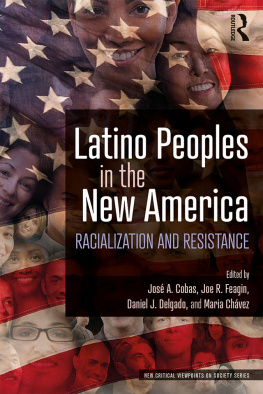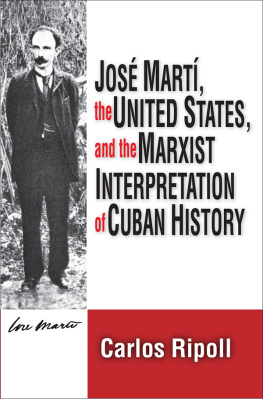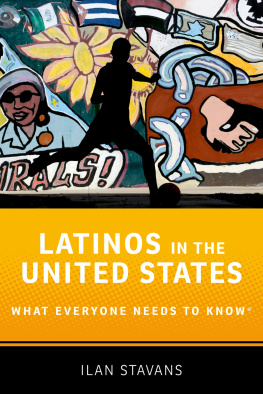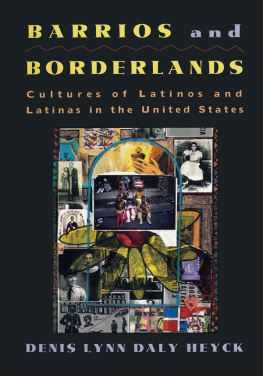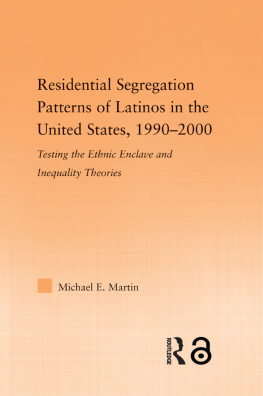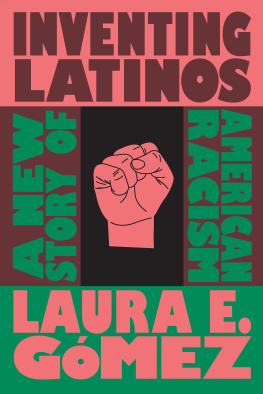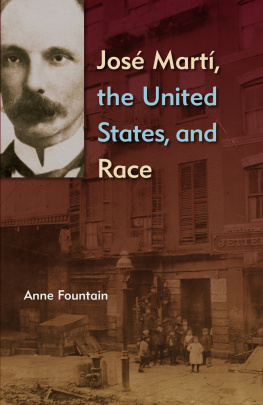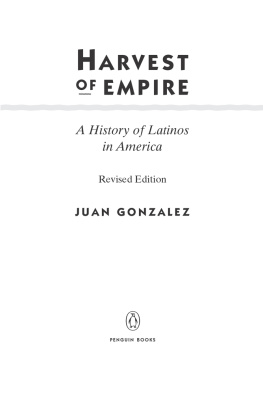HOW THE UNITED STATES
RACIALIZES LATINOS
HOW THE UNITED STATES
RACIALIZES LATINOS
WHITE HEGEMONY AND ITS CONSEQUENCES
Edited by
Jos A. Cobas, Jorge Duany, and Joe R. Feagin
The editors agree with the goals of colleagues who want to affirm the dignity of women by modifying standard Spanish language terms. However, we do not follow in this book all of their specific language practices.
We observe standard Spanish grammar in respect to grammatical gender. We also adhere to standard Spanish grammars rules on diacritics. Two exceptions are the names of individuals who do not use diacritics and the titles of existing publications.
First published 2009 by Paradigm Publishers
Published 2016 by Routledge
2 Park Square, Milton Park, Abingdon, Oxon OX14 4RN
711 Third Avenue, New York, NY 10017, USA
Routledge is an imprint of the Taylor & Francis Group, an informa business
Copyright 2009, Taylor & Francis.
Copyright 2008(2009) Counting Latinos in the U.S. Census, by Clara E. Rodrguez.
All rights reserved. No part of this book may be reprinted or reproduced or utilised in any form or by any electronic, mechanical, or other means, now known or hereafter invented, including photocopying and recording, or in any information storage or retrieval system, without permission in writing from the publishers.
Notice:
Product or corporate names may be trademarks or registered trademarks, and are used only for identification and explanation without intent to infringe.
How the United States racializes Latinos : white hegemony and its consequences / edited by Jos A. Cobas, Jorge Duany, and Joe R. Feagin.
p. cm.
Includes bibliographical references and index.
ISBN 978-1-59451-598-9 (hardcover : alk. paper)
ISBN 978-1-59451-599-6 (paperback : alk. paper)
1. Hispanic AmericansGovernment policyUnited States. 2. Hispanic AmericansSocial conditions. 3. United StatesRace relations. 4. RacismUnited States. I. Cobas, Jos A. II. Duany, Jorge. III. Feagin, Joe R.
E184.S75H74 2009
305.868073dc22
2008042253
ISBN 13: 978-1-59451-598-9 (hbk)
ISBN 13: 978-1-59451-599-6 (pbk)
Designed and Typeset by Straight Creek Bookmakers.
To the late Bernard Farber and Joe Feagin
Eminent scholars, generous friends
Jos A. Cobas
Contents
Jos A. Cobas, Jorge Duany, and Joe R. Feagin
Rubn G. Rumbaut
Clara E. Rodrguez
Fernando Purcell
William D. Carrigan and Clive Webb
Laura E. Gmez
Ofelia Garca
Jane H. Hill
Lisandro Prez
Elizabeth Aranda, Rosa E. Chang, and Elena Sabogal
Xchitl Bada and Gilberto Crdenas
Nestor P. Rodriguez and Cecilia Menjvar
Zulema Valdez
Jorge Duany
Wendy D. Roth
Jos A. Cobas, Jorge Duany, and Joe R. Feagin
Despite its scientific disrepute, the concept of race remains a powerful social determinant in the United States. The racialization of Latinos refers to their definition as a racial group and the denigration of their alleged physical and cultural characteristics, such as phenotype, language, or number of children. Their racialization also entails their incorporation into a white-created and white-imposed racial hierarchy and continuum, now centuries old, with white Americans at the very top and black Americans at the very bottom. Thus, one can speak about the intense racialization of daily life, including health, housing, education, work, friendship, and marriage patterns. In this introductory chapter, we trace the modern concept of race in Europe from its origin in the fifteenth century and the racialization of Latinos and Latin Americans in the United States since the nineteenth century. We also provide a brief overview of the main contributions of the individual chapters of this volume.
THE ORIGIN OF THE CONCEPT OF RACE IN EUROPE
In the fifteenth century, the Portuguese became the first Europeans to travel to Africa and establish trading posts on its western coast. They initially exchanged such goods as metal pots and wine for Africans gold and spices. As the demand for enslaved Africans increased and made their transport more profitable than trade in nonhuman goods, enslaved Africans became the cargo of many Portuguese ships.
The Spanish nation-state was the first to colonize on a large scale indigenous societies in the Americas for their resources, but its growing wealth and military apparatus were soon countered by the imperial expansion of competing English, Dutch, and French nation-states. Early on, Spanish and English conquerors and enslavers in the Americas rationalized the oppression of indigenous and African peoples in both Christian religious terms (uncivilized, un-Christian) and physicalbiological terms (ugly, apelike). The massive enslavement of Africans awakened the interest of European and North American scholars. Some of the latter had even invested in the slave trade, and many others began to accent European superiority and African inferiority. By the last few decades of the 1600s, British and other European thinkers were laying the groundwork for a hierarchy of biologically distinctive races, which developed more fully over the eighteenth century. Englands Sir William Petty, a leading anatomist, portrayed enslaved blacks as physically and culturally inferior to whites. Drawing on European travelers accounts of the Americas and Africa, Petty advocated a ladder-like ranking of unchangeable human species or races characterized by physical and social differences. He insisted that natives of the southern tip of Africa were the most beastlike of all the souls of men with whom our travelers are well acquainted (quoted in Shore, 2000:87; see also Feagin, forthcoming).
In Germany, the Wests leading philosopher, Immanuel Kant, taught philosophy and what would later become social science. His treatise, On the Distinctiveness of the Races in General ([1775] 1950), laid out one of the first hierarchical models of human races. Kants work, which he claimed was based on science, conceived races as differences in the human genus shaped by different environments. Races varied in physical traits such as skin color, physiognomy, and body type, as well as in psychological temperament. Kant paid special attention to Negro traits. A physiological process ending with the evaporation of the acids of phosphorous, Kant asserted, makes Negroes stink. Although in his racist view blacks were well prepared for physical labor, they were also lazy, soft and dawdling ([1775] 1950:22). This early white racial framing of people of African descent influenced most subsequent models of the racial hierarchy in Western societies.
Shaped by English thinkers such as Petty in the late 1600s and early 1700s, the first conceptualizations of race in North America developed over the next century on the basis of a belief in the supremacy of the Anglo-Saxon race, supposedly linked to superior Germanic groups (Horsman, 1981). Variations on this Anglo-Saxon myth were widely popular in North America. Thomas Jefferson, the most famous of the U.S. founders and a patrician slaveholder himself, was the first American intellectual to write extensively on racial matters. Jefferson led in creating self-satisfying rationalizations for the enslavement of African Americans. In a passage reminiscent of David Humes stereotyping of Africans (Morton, 2002) and of Kants overtly racist thinking ([1764] 1965), Jefferson argued that enslaved African Americans did not have any achievements that would demonstrate their human equality: But never yet could I find a black had uttered a thought above the level of plain narration; never saw even an elementary trait of painting or sculpture (quoted in Gossett, 1997:43). A man with great influence over the next century, Jefferson read and was influenced by the earlier work of scientists such as Petty, including their negative views of black Americans. In Jeffersons only intellectual book, the influential



